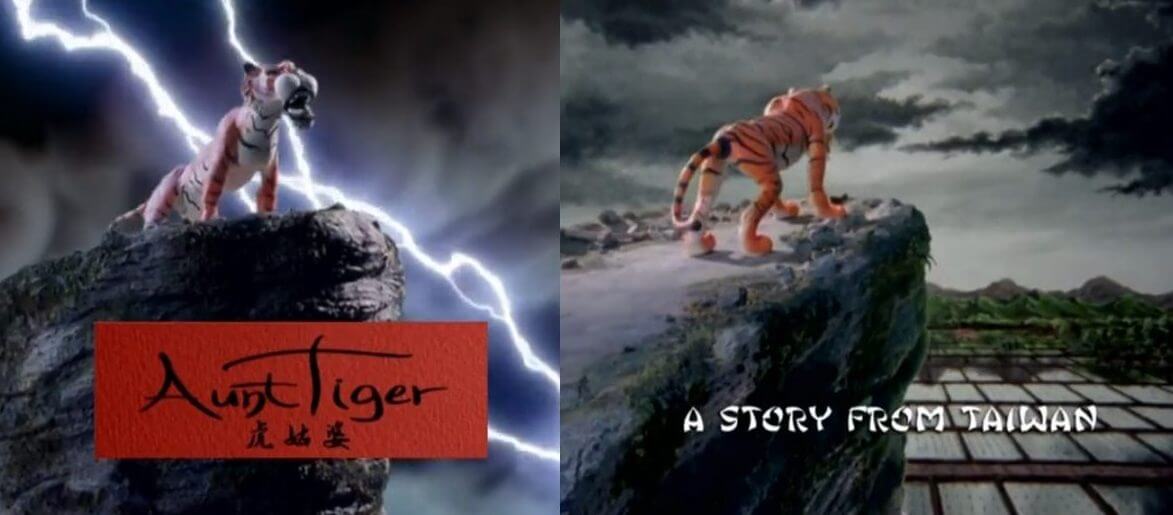Discover A Classic Taiwanese Legend and Impress Friends with your Aunt Tiger Nursery Rhyme Knowledge!
In the Western world, there are stories like Little Red Riding Hood and The Wolf and the Seven Young Goats.
They teach children not to trust strangers and not to open the door for them.
In Taiwan, there’s also a legend with a similar plot that has been passed down from generation to generation.
This is the story of Aunt Tiger (虎姑婆 Hǔ gūpó).
Aunt Tiger || Introduction
Aunt Tiger || The legend
Aunt Tiger || Other versions
Aunt Tiger || Nursery rhymes
Aunt Tiger || Extended Learning
Aunt Tiger || FAQs
Discovering Aunt Tiger Through Animation
Taiwan Public Television Service and British S4C (Channel 4 Wales) have co-produced a clay animation on this story. In 2000, it won the Children’s Jury 1st Prize in the category of Television Animation at the 17th Chicago International Children’s Film Festival.
Now, with images extracted from the animation, we are traveling back to a Hakka village in Ancient Taiwan to see what happened.

Aunt Tiger || The Taiwan legend
An Introduction to Aunt Tiger
A long time ago, there was a tiger who always wanting to become human.
One day, he found a secret receipt in a cave. According to the instruction on it, he could transform into a human completely after eating 3 children.
Thus he went to the village to look for his victims.
First, he appeared in front of a cowherd.
By talking and offering him poisoned sweets, the tiger got his first victim and the information that there were also three children in the house nearby.

During this time, the children, A-Xiang, A-Mei, and their mother were going to a wedding.
They were still waiting for their third aunt since she promised to babysit their little brother A-Qiang.
Later, their mother left first and told them to join her after the arrival of the aunt. A-Xiang didn’t want to wait and therefore left right after their mother left.
She met the tiger on the way to the wedding.
Again, with the same trick, the tiger arrested his second victim, knowing that A-Xiang still had a sister and brother at home.

At first, A-Mei refused to open the door for the tiger despite his hard trying.
After meeting the aunt, who was coming for A-Qiang, the tiger also kidnapped her back to the cave.
Then he pretended to be the aunt and successfully entered the house.
When A-Mei was going to leave for the wedding, she noticed that “the aunt” had a tail.
Later, it dawned on her that she was actually a tiger.

A-Mei was scared but quickly prepared traps in order to kill the tiger. However, in the end, the tiger still took her baby brother away.
A-Mei carried the firecrackers with her which were originally for the wedding and followed them to the cave.
There she threw the burning crackers to the tiger and rescued the cowherd, A-Xiang, third aunt, and A-Qiang.
Finally, the cave collapsed due to the quake caused by the crackers and hence the tiger died inside.
Other Versions of Aunt Tiger
As with many other legends, Aunt Tiger also has various differing versions. The best-known version might be this one…
The mother had to travel to another village far away. At night, since the mother still hadn’t returned home, the tiger disguised as their aunt and convinced the girls to let him in.
In the middle of the night, the elder sister was woken up by a strange noise. She found that the aunt was eating the fingers of her younger sister.
With the excuse of going to restroom, the girl quickly went to the kitchen to prepare a big pot of hot oil.
She climbed up the tree and hung up the pot. When the tiger felt suspicious and went to the yard to check, the girl poured down the hot oil and killed it.
Despite the fact that this version is way more scary and tragic, it is indeed one of the shared memories of many Taiwanese people.
They also recognize it as one of the most terrible nightmares of their childhood.

Ghost Month and Zhong Yuan Festival | Discover Taipei Traditions
Ghost Month & Zhong Yuan Festival takes place in the entirety of the July of the lunar calendar. Find out what it is and when it’s celebrated.
Nursery Rhyme of Aunt Tiger
Not only the legend itself, but also the nursery rhyme of Aunt Tiger is widespread. Parents like to teach their children this song.
They even take advantage to “intimidate” them to behave well and go to sleep earlier.
If they are not obedient, Aunt Tiger will visit them in the middle of the night to bite off their ears and fingers.
The lyrics go like this:
好久好久的故事
Story of a long long time ago是媽媽告訴我
My mommy told me so在好深好深的夜裡
In the middle of the dark night會有虎姑婆
Auntie Tiger is there standing by愛哭的孩子不要哭
Crying baby, don’t you cry她會咬你的小耳朵
She will bite your little ears不睡的孩子趕快睡
Sleepless baby, go to sleep她會咬你的小指頭
She will bite your little fingers還記得 還記得
Still remember, still remember瞇著眼睛說
I narrow my eyes and murmur虎姑婆別咬我
Auntie Tiger don’t bite me乖乖的孩子睡著了
Obedient baby falls asleep
Extended Learning from Aunt Tiger
虎姑婆 Hǔ gūpó
To be more precise, 姑婆 gūpó actually means “great-aunt” or “grand-aunt” since the word 婆 pó refers to “elderly lady”.
In Taiwan, ladies who are around the age of our grandparents are also called 阿婆 āpó.
However, due to the fact that almost every current English version translates it as “Aunt (姑姑 gūgū or 姑媽 gūmā) Tiger”, here we also follow this convention in order to avoid confusion.
Now let’s learn some Chinese idioms related to the keyword “tiger” (虎 hǔ / 老虎 lǎohǔ).
母老虎 Mǔ lǎohǔ (tigress)
If we say a female is a 母老虎 Mǔ lǎohǔ, it means that she is as fierce and aggressive as a tiger. But remember, this description has a derogatory sense, some even find it offensive. Thus, be careful when using it.
秋老虎 Qiūlǎohǔ (autumn tiger)
This idiom is used to describe the climate. Usually, the temperature falls down and turns more pleasant in autumn (秋天 qiūtiān). However, if it suddenly becomes unbearably hot like summer, we call it 秋老虎 qiūlǎohǔ since 老虎 lǎohǔ gives an impression of violence.
紙老虎 Zhǐlǎohǔ (paper tiger)
If we call someone 紙老虎 Zhǐlǎohǔ, it implies that this person looks threatening and powerful on appearance, but actually is weak and hollow inside. Just like a tiger made of paper. At first, it may scare you, but later you’ll find that it can’t do you any harm and it’s easy to be torn down.
把老虎當成病貓 Bǎ lǎohǔ dāngchéng bìng māo (take the tiger for a sick cat)
This means someone underrates someone or looks down on someone.
For example: 露一手給他們瞧瞧,別讓他們把老虎當成病貓了! Lòuyìshǒu gěi tāmen qiáo qiáo, bié ràng tāmen bǎ lǎohǔ dāngchéng bìngmāo le! (Show them what you can do, don’t let them take the tiger for a sick cat! ) Sometimes we also say: 老虎不發威,被人當病貓。Lǎohǔ bù fāwēi, bèi rén dāng bìng māo. (When the tiger doesn’t roar, it’s taken for a sick cat.)
BONUS || Come and discover your Chinese Zodiac now!
Have you heard of Aunt Tiger before, or perhaps something similar? Tell us in the comments below, we’d love to hear from you.
Aunt Tiger || FAQs
What is Aunt Tiger in Chinese?
Aunt Tiger in Chinese is 虎姑婆 hǔ gūpó.
What is the nursery rhyme for Aunt Tiger?
好久好久的故事
Story of a long long time ago
是媽媽告訴我
My mommy told me so
在好深好深的夜裡
In the middle of the dark night
會有虎姑婆
Auntie Tiger is there standing by
愛哭的孩子不要哭
Crying baby, don’t you cry
她會咬你的小耳朵
She will bite your little ears
不睡的孩子趕快睡
Sleepless baby, go to sleep
她會咬你的小指頭
She will bite your little fingers
還記得 還記得
Still remember, still remember
瞇著眼睛說
I narrow my eyes and murmur
虎姑婆別咬我
Auntie Tiger don’t bite me
乖乖的孩子睡著了
Obedient baby falls asleep
How do you say Tiger in Chinese?
Tiger in Chinese can be said 老虎 lǎohǔ.
What is a Paper Tiger?
If we call someone 紙老虎 zhǐlǎohǔ, it implies that this person looks threatening and powerful on the appearance, but actually is weak and hollow inside.
Want more from LTL?
If you wish to hear more from LTL Language School why not join our mailing list.
We give plenty of handy information on learning Chinese, useful apps to learn the language and everything going on at our LTL schools!
Sign up below and become part of our ever growing community!
BONUS | Want to study the local Taiwanese dialect known as Hokkien? We provide Hokkien classes in person and online.

 Hi, my name is Greta. I am from Italy and I work as a student advisor at our Taipei school.
Hi, my name is Greta. I am from Italy and I work as a student advisor at our Taipei school. Hi, my name is Manuel! I am from Spain and I am a Student Advisor at LTL. I’m now based at our Seoul School after living 3 years in Taipei.
Hi, my name is Manuel! I am from Spain and I am a Student Advisor at LTL. I’m now based at our Seoul School after living 3 years in Taipei.





6 comments
[…] belief can be traced back to Tang Dynasty (唐朝 Táng cháo, 618AD-907AD). Legend has it that one evening a young student named Wéi Gù (韋固) saw an old man leaning against a […]
[…] known by her Taiwanese name 七娘媽 Qī niáng mā (Taiwanese pronunciation: Tshit-niû-má). Legend has it that July 7th is also her […]
[…] Legend has it that July 15th is the birthday of a Taoism god 地官大帝 Dì guān dàdì. He is regarded as the god to reduce the sins of the suffering ghosts and set them free. On his birthday he will amnesty the sins of all the ghosts. Thus believers worship him for redeeming the souls of their family who has passed away from purgatory. […]
[…] in Qing Dynasty, Hakka people united and formed their own military self-defense force, which was called 義民軍 Yìmín […]
[…] LTL Mandarin School: https://ltl-taiwan.com/aunt-tiger/ […]
[…] of the Tiger Grandmother (another translation of this is here). Taiwan has the story of the Aunt Tiger (and different versions exist of this too!). There are versions across the African continent too, […]